The Gokhale® Wedge 2.0
In Spring last year we launched the Gokhale® Wedge. For years, our students have been requesting a convenient, ready-made wedge for upright sitting without a backrest, one that doesn’t require folding blankets and other makeshift (pun intended) measures. The requests also specified an attractive item to enjoy around the home or office, and that it be of durable quality, keeping its shape and good looks with daily use.
Many sitting wedges on the market provide a shallow, even slope that simply does not help you antevert your pelvis—at no place do they offer the steep incline that it takes to tip the pelvis forward “over a cliff,” so to speak. Worse, they are often too soft, allowing the bottom, which after all transmits most of the body’s weight to the wedge, to sink in too deeply, sometimes resulting in a reverse wedge! Some commercial wedges are simply too hard to be comfortable, and at best provide only one choice of angle for tipping the pelvis forward.
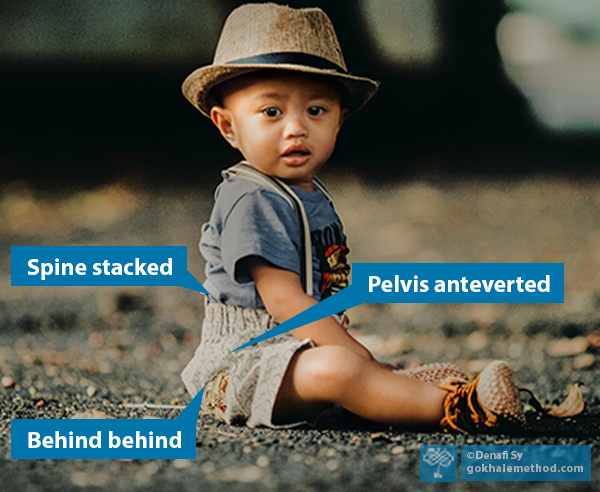
As infants we all sat easily with our behinds behind us, and our pelvis anteverted. A wedge helps us to regain this healthy angle. Image from Pexels
To implement the Gokhale Method technique of stacksitting, students require a firm but comfortable wedge with a choice of angles to tip the pelvis just the right amount for their particular body. This is required to be able to sit upright and relaxed, rather than the common back and forth between upright and tense, and relaxed but slumped. Stacksitting enables you to avoid compression on delicate spinal nerves, discs, and tissues, and encourages healthy breathing and organ function.
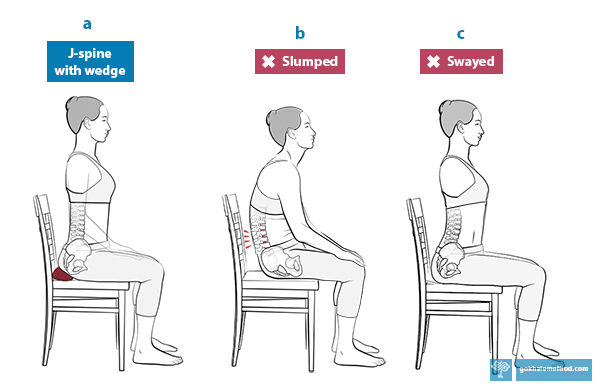
Your pelvis is the foundation for your spine and upper body. With the pelvis anteverted and a J-spine arising from a healthy L5-S1 angle and well-stacked vertebrae, the upper body can be upright and relaxed (a). Without a wedge, most people sit either relaxed but slumped (b), or upright but tense (c).
Simplicity can take longer
It’s astonishing to me how long it took to pare a design for a Gokhale wedge down to its essential elements. We’ve been working on this for over a decade. We’ve hired professional design consultants, graduate students in Product Design at Stanford, and discussed the matter amongst our teachers. After discarding dozens of designs that included sophisticated mechanisms for adjusting the slope of the wedge, or replicated the front edge of chairs from the period of Louis XIV, we finally came to a wedge that is beyond simple by comparison.
Our wedge, which only saw the light of day in March last year, is the simplest of all the designs we came up with—it’s a simple piece of foam, with a simple covering, and a simple zipper to close it up. Admittedly, the foam has a special shape—though that is not immediately obvious—and is of a high quality, resilient spec. It has just the right amount of give to be comfortable yet firm.
Meeting needs and expectations
Above all, our students need a wedge designed to translate healthy posture principles into action. And rather than being a one-size-fits-all, this posture-friendly wedge works even as the user’s J-spine and L5-S1 angle progresses.
Based on eighteen months of user feedback, we can say that the Gokhale® Wedge is serving people extremely well. It has been a great inclusion with the online Elements course bundles, ensuring students are always best equipped to efficiently learn to stacksit. Our students don’t hesitate to let us know what is working well for them…

…and what can still be improved. We have listened to user suggestions and recently applied a few innovations that we hope will make you like our wedge even more.
New features of the Gokhale Wedge 2.0
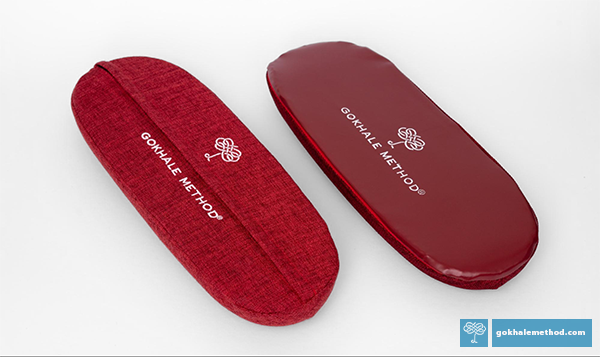
The original wedge (left) and its updated version (right) perform the same functions, assisting your pelvis and spine to be optimally positioned in sitting. The new Gokhale® Wedge has some innovations that we think you will like even better.
Sitting on the flat side: Our wedge has both a flat and a convex, rounded side. Using it flat side up, as shown below, it behaves like a teeter totter and gives varied options for the angle of its slope. This enables lighter people, and people with less L5-S1 angle, to tilt the wedge forward only as much as they want, and to sit on it higher or lower down, to find just the right amount of angle for them. It can give a gentle introduction to pelvic anteversion for those with sciatic pain, sacroiliac joint issues, or stiffness at the L5-S1 junction. As I already have a good bit of built in wedge in my third decade of stacksitting, glidewalking, etc.), this way around also suits me just fine.
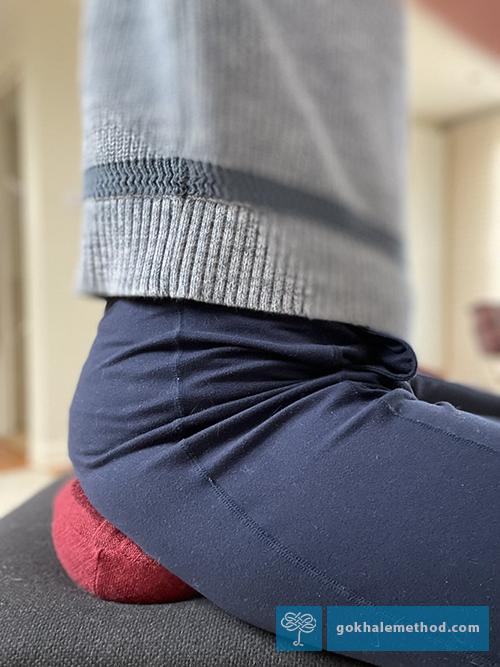
Sitting on the flat side of your wedge gives you a wide choice of height and angle.
To make sitting on the flat side smoother and even more comfortable, we have moved the zip of the washable cover from the center of the flat side to the edge of the new wedge.
Sitting on the convex side: We have introduced a new non-slip PU leather on the flat side, giving users a non-slip base on slippery surfaces such as some wooden chairs and benches. As before, one of its rounded edges is slightly lower and less steep than the other, giving you nuanced choices of angle whichever way around you choose to use your wedge.
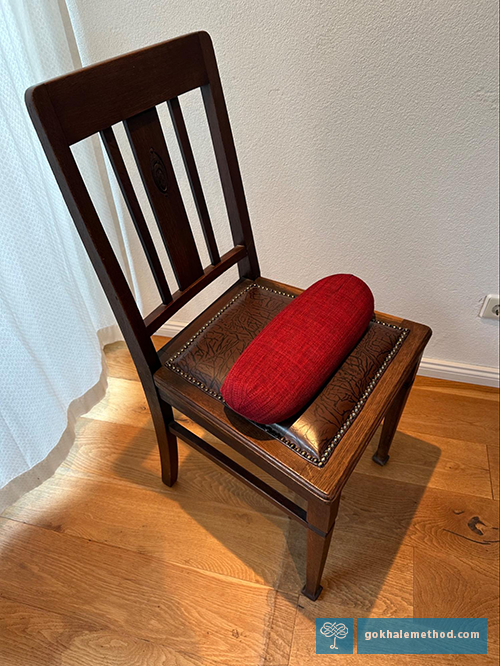
This wedge is positioned ready for stacksitting, rounded side up. This way around can give the most anteversion by encouraging the pelvis to drop forward. The front edge as it is positioned here is slightly lower and has a gentler curve than the back edge.
A change of fabric: The wedge is now in the same, slightly darker burgundy fabric that we use for our Gokhale® Head Cushion. It’s not only a nice aesthetic match, but its slightly coarser weave fabric also gives a better grip.
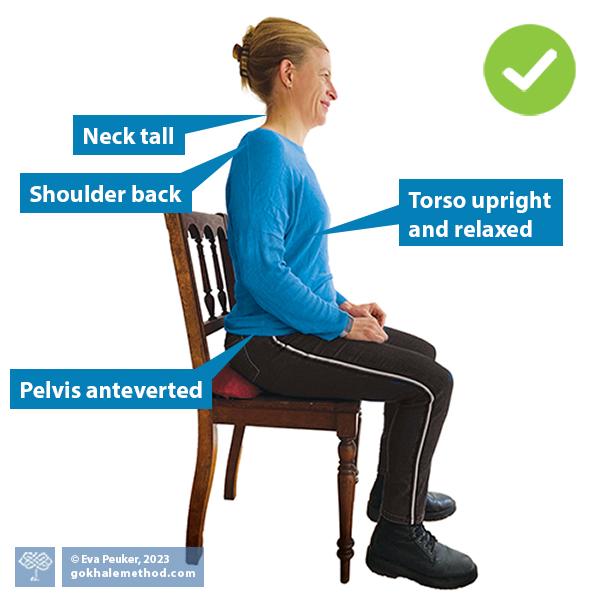
A well-designed wedge helps you to rediscover sitting comfort. It helps create healthy J-spine muscle memory for standing and walking too.
If you want to find out more about using our wedge, you can read our introductory blog post The Gokhale® Wedge for Relaxed, Upright Sitting, and view a video of me using it:
Here I am demonstrating how to sit on the Gokhale Wedge. Several postural principles combine to make stacksitting especially beneficial for our structure.
Your Gokhale® Wedge is backed up with know-how
No matter how well-designed, a wedge for sitting is best supported by training. This is true of all our products, but perhaps especially so for our wedge, because stacksitting is a big departure from most people’s sitting form. You can learn about stacksitting in our in-person Foundations course, one-day Pop-up course, our online Elements course, plus our Gokhale Exercise program. These offerings, along with our DVD Secrets to Pain-Free Sitting, all teach the skills that enable you to enjoy your wedge optimally in daily life.
Our students also appreciate being able to integrate using the wedge with our wearable PostureTracker™, which has settings that can track the degree of your L5-S1 angle, and the stack of your spine. Consider the Gokhale® Wedge a part of your toolkit as you improve your posture, and musculoskeletal health.
Best next action steps for newcomers
If you would like insight on your sitting posture, consider scheduling an Initial Consultation, online, or in person.
You can sign up below to join any one of our upcoming FREE Online Workshops…

Comments
It’s amazing how a simple…
It’s amazing how a simple tool can make such a difference in spinal alignment agario and help reduce tension in the back and hips
Add New Comment
Login to add commment
Login